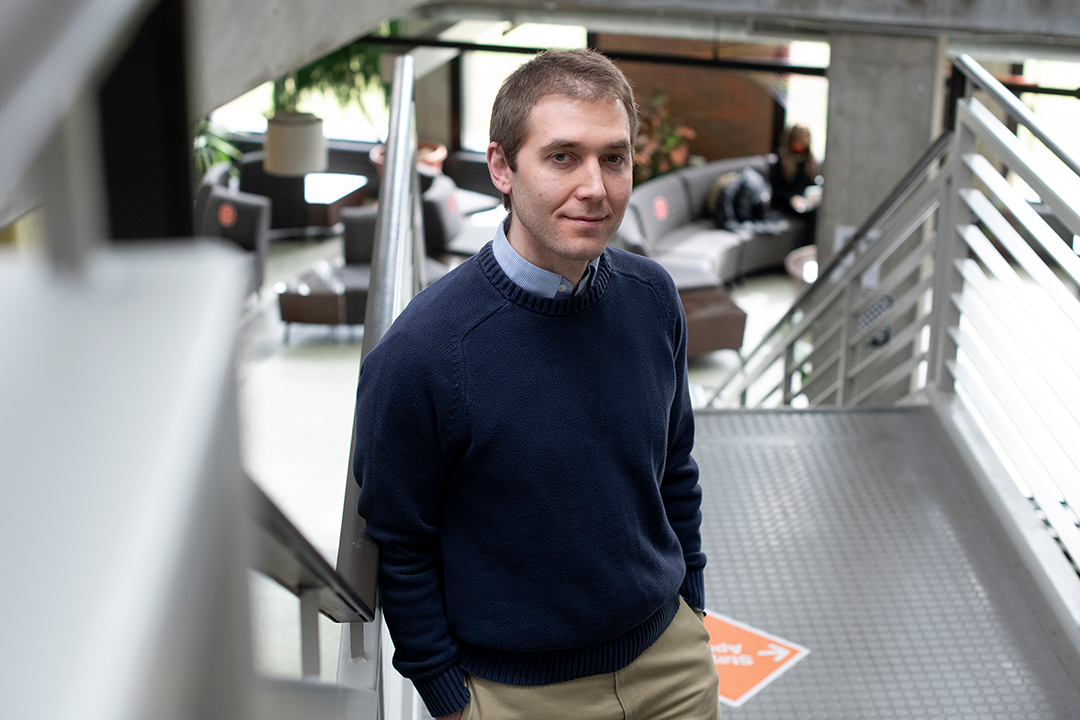Eisenhart Award winner Nathaniel Barlow strives to bring out the fun in math
A. Sue Weisler
Associate Professor Nathaniel Barlow from the School of Mathematical Sciences was recognized as one of this year’s winners of the Eisenhart Award for Outstanding Teaching, RIT’s highest honor for tenured faculty.
Nathaniel Barlow has always looked for creative ways to help his students solve mathematical problems, but when the coronavirus pandemic moved his classes online, it forced him to rethink his approach.
Barlow, an associate professor in RIT’s School of Mathematical Sciences in the College of Science, often uses things like 3D printed models in the classroom to help students visualize math concepts. But teaching classes in an online synchronous setting did not allow for those tactile demonstrations, so he quickly began cooking up new methods of engaging students in his home kitchen, where he has taught since the pandemic began.
“I take lots of small risks by using different types of technology in class to see if they work,” said Barlow. “It’s almost like doing a random sampling of different teaching techniques, then you see what resonates with students. By trying different things, there’s a feedback process between me and the students and I see what they respond to and I go in that direction.”
2020-2021 Celebration of Teaching and Scholarship Honorees
Amanda Bao: Building bridges as an engineer and a teacher
Eisenhart award winner Ammina Kothari applies research methods to improve her teaching
Emmett Ientilucci’s knack for engaging students earns him award for excellence in teaching
Embracing experimentation in the classroom has worked well for Barlow, who is receiving an Eisenhart Award for Outstanding Teaching—RIT’s highest honor for tenured faculty—in just his first year as tenured faculty. Previously, Barlow has also been recognized with the Richard and Virginia Eisenhart Provost’s Award for Excellence in Teaching and the Innovative Teaching with Technology Award.
This year he has kept students in his differential equations and boundary value problems classes engaged using everything from karaoke to augmented reality to self-produced skits based on popular TV shows like The Office and The Twilight Zone. He said he could tell when his lessons were really hitting home because activity in the chatroom would skyrocket and lead to important discussions. He found it heartening to see people in his class of more than 100 students being so active in the chat, helping one another and building connections.
“I think the students deserve a lot of this award—they contributed to it because they made the class so fun,” said Barlow. “It’s really isolating right now for students and the class can be an opportunity for them to not be isolated and do something that they love. All the students in my classes are STEM majors, so at some point in their careers said they love math. Knowing that it’s in every one of them, I try to bring it out and use that as a community building tool for the class so that we can all share in this fellowship of the love of math and tinkering and building things.”
Barlow said his mathematical modeling Ph.D. student Colin Huber served as recitation instructor and chat moderator for the differential equations class and was critical in keeping the students engaged. He thanked many others for the award, including his college professors from Clarkson University—notably Ronald LaFleur, Kathleen Kavanagh, Brian Helenbrook, and David Wick, who is now assistant vice president for research and assessment in RIT’s Division of Diversity and Inclusion—as well as his RIT research partner and mentor Steven Weinstein, head of the Department of Chemical Engineering. He also noted he was extremely fortunate to have childcare throughout the pandemic to enable him to teach his classes online synchronously.
And he said he is happy to be in an environment that values teaching.
“The faculty in the math department have inspired me,” said Barlow. “They’re all really good teachers and I’m in a good department. One of the reasons I chose to come to RIT was the focus on teaching—I think it’s unique that they allow us to sort of spread our teaching wings.”
2020 Eisenhart Award Recipients
The 2019-2020 Eisenhart Award recipients are also being recognized at the April 14 event.
Jeanne Christman excites student learning with engaging teaching style
James Perkins wins Eisenhart Award for Outstanding Teaching
Professor Michael Richmond’s passion for teaching physics and astronomy earns him Eisenhart Award
Josh Thorson culminates rewarding, challenging year with Eisenhart Award








